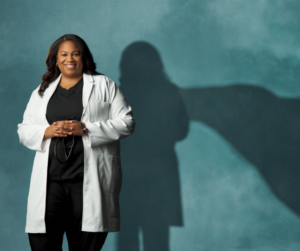
Takeia Horton, PA-C, MPH believes representation in medicine matters, and her education and career path reflect that.
“My personal and family experiences with health care showed me how much cultural bias existed in the medical profession,” said Horton.
She decided to attend PA school to help alleviate cultural and racial biases in health care.
Horton obtained a Master of Public Health in behavioral sciences and health education and worked in clinical vaccine research and community health. She developed an interest in working to improve individual health and health literacy among minority populations.
“I wanted to help build trust between minority, underserved and stigmatized communities and health care by serving as a bridge between the two, and becoming a Certified PA was the right opportunity for me to do so.”
Horton graduated from Emory University School of Medicine PA program in 2014. She has practiced in family medicine for seven years and typically sees between 15-20 patients daily for annual physicals, pap smears, chronic disease management and STD screenings among others.
“Every day in family medicine is different – you never know what you’ll see or treat.”
When asked what the most rewarding part of her career is, Horton says it’s when a patient feels comfortable being treated by a provider who shares the same cultural background.
“When patients tell me that no one has ever explained their disease in a way that they could understand until they see me, it inspires me to keep going.”
She also gets excited when she can inspire the kids in her local community to pursue a career in medicine.
Originally from Middle, Georgia, Horton currently lives and works in Atlanta. She believes Certified PAs are uniquely positioned to be flexible, versatile providers on a health care team. She works on a team with other PAs, nurse practitioners, doctors, medical assistants and administrative staff to ensure that patients get the care they deserve.
Horton encourages future PAs to be the change they want to see in a world where health disparities continue to affect marginalized communities. “Believe in yourself. If you want it, you can achieve it.”
